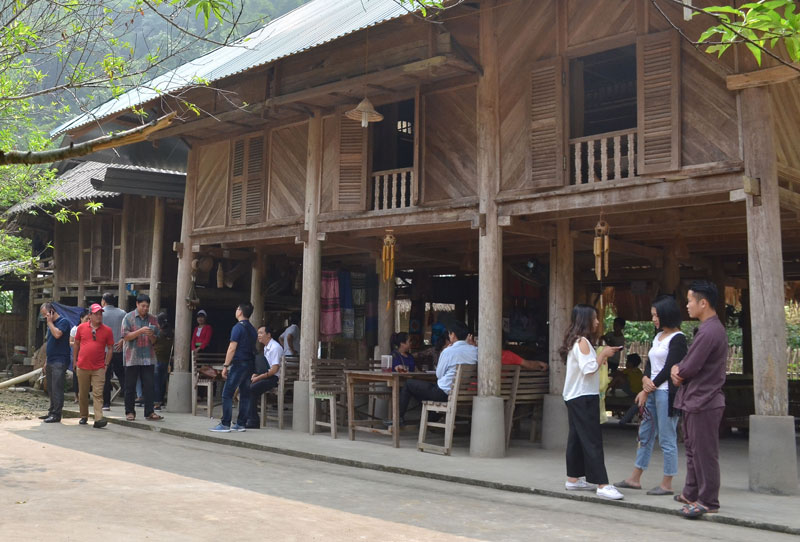
(HBO) – The Tu Ly – Hien Luong site was among the four revolutionary bases in Hoa Binh located within the Hoa – Ninh – Thanh warzone (Quang Trung warzone) during the August 1945 Revolutionary.

Community-based
tourism in Ke hamlet, Hien Luong commune (Da Bac).
Returning to Hien Luong in a typical Autumn day of August, I saw
the land, once a revolutionary base, transforming itself into a new rural style
area. The locality’s natural land spans 4,000 hectares, yet just a small
portion of this is suitable for agriculture while and the majority is forestry
land. Local authorities have worked to guide residents to capitalise on the
limited agriculture land. To date, local farmers have cultivated 11.5 ha of
summer-autumn rice and 140 ha of corn, while tending 45 ha of cassava, 20 ha of
edible canna, 1 ha of small taro, 3 ha of ginger, 3 ha of bean and peanut, and
7.5 ha of vegetables. As for animal husbandry, they have been focusing on
raising 220 buffalos, 316 cows, 635 goats, and over 16,000 fowls.
Taking advantage of Hien Luong’s lake areas, its people have
invested in aquatic farming of species, known as local specialties, in recent
years. Fish farms currently occupy 12.1 ha of water surface in the commune, of
which 8.1 ha are employed to raise fish in 389 cages. Of the total cages, 154
are self-invested, while 135 others have secured support under Decision 10 of the
provincial People’s Committee. These farms’ productivity has to date exceeded
30 tonnes, of which 6.8 tonnes are caged fish.
The local stunning lakes create a favourable condition for the
development of community tourism. A number of residents in Ke hamlet have taken
part in the business. They received support from the Australian Foundation for
the Peoples of Asia and the Pacific in terms of capital, house upgrade,
equipment purchase, and training courses. The business is new to locals but
showing potential in attracting foreign and domestic visitors who want to
discover local life and culture.
More than just an information technology teacher, Bui Van Nien is an inspiring figure who has nurtured the scientific curiosity and creative spirit of students in Vietnam’s ethnic minority communities.
Da Bac is the most disadvantaged mountainous district in Hoa Binh province, with ethnic minorities accounting for about 90% of its population. Over the past years, the district has mobilised resources to implement ethnic policies to improve the quality of life of local people.
In recent years, Hoa Binh province has consistently prioritised the protection, care, and education of children, particularly those from ethnic minorities and disadvantaged backgrounds, by creating a safe, healthy, and nurturing environment for their all-round development.
The Steering Committee for Tobacco Harm Prevention and Control of Hoa Binh province, in coordination with the Tobacco Harm Prevention and Control Fund, held a ceremony on May 28 in response to the World No Tobacco Day (May 31) and the National No Tobacco Week (from May 25 to 31). The event was chaired by Nguyen Van Toan, Standing Vice Chairman of the provincial People’s Committee and head of the Steering Committee.
Since 2021, the Center for Industrial Promotion and Industrial Development Consulting (CIIDC) under the Department of Industry and Trade has been implementing a school lighting model as part of the plan for using energy efficiently and economically in Hoa Binh Province in the pẻiod of 2021 - 2025. This model not only aims to improve the learning conditions and enhance the education quality, but it also promotes the message of energy saving, energy security, environmental protection and contributes to the goals of socio-economic development.
In the 2024 - 2025 school year, the entire Hoa Binh provincial education sector includes 520 educational institutions and schools. Among them are 13 ethnic boarding schools with 153 classes and 4,487 students. Four of these schools have met national standards, reaching 30.7 percent.



